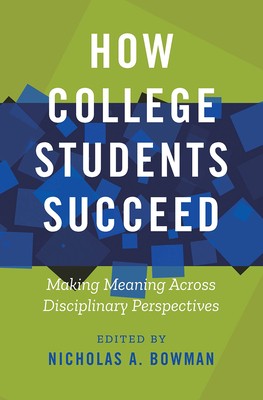
- We will send in 10–14 business days.
- Publisher: Stylus Publishing (VA)
- ISBN-10: 1642671339
- ISBN-13: 9781642671339
- Format: 15 x 22.8 x 2 cm, minkšti viršeliai
- Language: English
- SAVE -10% with code: EXTRA
How College Students Succeed (e-book) (used book) | bookbook.eu
Reviews
Description
Receiving a college education has perhaps neverbeen more important than it is today. While its personal, societal, and overall economic benefits are well documented, too many college students fail to complete their postsecondary education. As colleges and universities are investing substantial resources into efforts to counter these attrition rates and increase retention, they are mostly unaware of the robust literature on student success that is often bounded in disciplinary silos.
The purpose of this book is to bring together in a single volume the extensive knowledge on college student success. It includes seven chapters from authors who each synthesize the literature from their own field of study, or perspective. Each describes the theories, models, and concepts they use; summarizes the key findings from their research; and provides implications for practice, policy, and/or research. The disciplinary chapters offer perspectives from higher education, public policy, behavioral economics, social psychology, STEM, sociology, and critical and post-structural theory.EXTRA 10 % discount with code: EXTRA
The promotion ends in 22d.16:47:24
The discount code is valid when purchasing from 10 €. Discounts do not stack.
- Publisher: Stylus Publishing (VA)
- ISBN-10: 1642671339
- ISBN-13: 9781642671339
- Format: 15 x 22.8 x 2 cm, minkšti viršeliai
- Language: English English
Receiving a college education has perhaps neverbeen more important than it is today. While its personal, societal, and overall economic benefits are well documented, too many college students fail to complete their postsecondary education. As colleges and universities are investing substantial resources into efforts to counter these attrition rates and increase retention, they are mostly unaware of the robust literature on student success that is often bounded in disciplinary silos.
The purpose of this book is to bring together in a single volume the extensive knowledge on college student success. It includes seven chapters from authors who each synthesize the literature from their own field of study, or perspective. Each describes the theories, models, and concepts they use; summarizes the key findings from their research; and provides implications for practice, policy, and/or research. The disciplinary chapters offer perspectives from higher education, public policy, behavioral economics, social psychology, STEM, sociology, and critical and post-structural theory.

Reviews